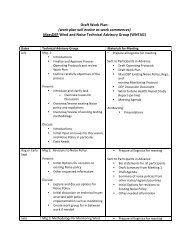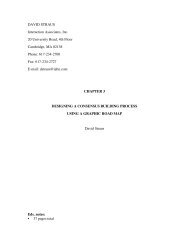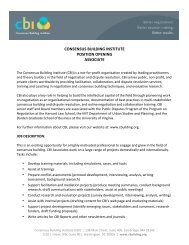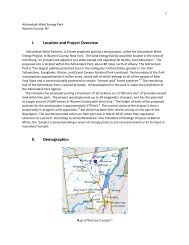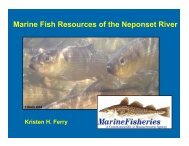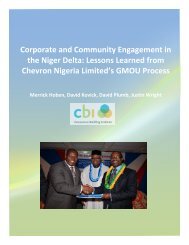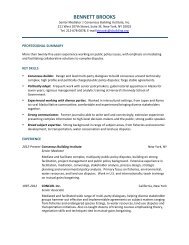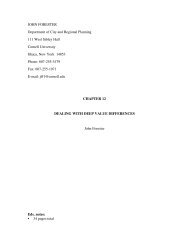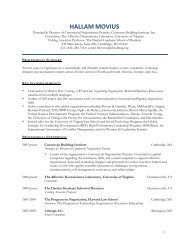A Mutual Gains Approach - Consensus Building Institute
A Mutual Gains Approach - Consensus Building Institute
A Mutual Gains Approach - Consensus Building Institute
You also want an ePaper? Increase the reach of your titles
YUMPU automatically turns print PDFs into web optimized ePapers that Google loves.
Effective Stakeholder<br />
Engagement and Negotiation,<br />
A Better <strong>Approach</strong>:<br />
A <strong>Mutual</strong> <strong>Gains</strong> <strong>Approach</strong><br />
1<br />
A Short History of Wind Siting<br />
• Wind siting is a policy problem<br />
– “If we can just get RPS or other policies in place…”<br />
• Wind siting is a technology problem<br />
– “If we can just get the right site, with the right equipment, with the<br />
right inter-connections…”<br />
• Wind siting is an impacts problem<br />
– “If we can just assemble the right facts and data about wind<br />
impacts…”<br />
• Wind siting is a negotiation problem<br />
– Wind, like any other siting problem, requires direct stakeholder<br />
involvement to realize the benefits and overcome the obstacles<br />
created by perceived local impacts<br />
2
<strong>Mutual</strong> <strong>Gains</strong> vs. <br />
Conventional <strong>Approach</strong>"<br />
Conventional<br />
<strong>Approach</strong>"<br />
<strong>Consensus</strong> <strong>Building</strong><br />
<strong>Approach</strong>"<br />
Goal" Technically viable plan" Technically and politically<br />
viable plan"<br />
Primary Client" Decision-makers" Decision-makers and<br />
stakeholder representatives"<br />
Tasks" Data-driven" Interest-driven with<br />
attention to data developed<br />
jointly"<br />
Skills" Technical" Problem-solving"<br />
Role of public<br />
participation"<br />
Provide input and advice"<br />
Build understanding and<br />
generate a proposed<br />
agreement"<br />
3<br />
4
Interests are the Fundamental <strong>Building</strong> Blocks<br />
of Agreement<br />
Interests:<br />
Our most important needs and concerns<br />
Positions: Specific ways to achieve our interests<br />
Key Question: ‘Why is that important to you?’<br />
! Of all the things we’ve discussed, which is most<br />
important to you?<br />
5<br />
Wind Siting Disputes: Underlying Theory<br />
• Siting conflicts often arise when interests<br />
are in conflict<br />
• No effort is made to listen to and/or respond<br />
to the interests of all the relevant<br />
stakeholders<br />
• Siting is not a zero-sum problem<br />
6
Keys to Success in Practice<br />
• Move from positions to interests<br />
• Help parties ground their interests and<br />
arguments in jointly developed facts<br />
• Seek to meet multiple interests<br />
simultaneously through trades or creative<br />
packaging<br />
7<br />
2. From Positions to Interests<br />
The Developer<br />
says:<br />
We’ve developed<br />
a proposal that<br />
makes the most<br />
sense for the<br />
Mt. March site<br />
We won’t<br />
make enough<br />
money<br />
We need to<br />
use the<br />
technology<br />
that we think<br />
is best<br />
Existing<br />
regulations<br />
shouldn’t<br />
apply in our<br />
situation<br />
We need to<br />
achieve a<br />
reasonable<br />
rate of return<br />
We want to<br />
reduce the<br />
risks<br />
associated<br />
with untried<br />
technologies<br />
We need our<br />
unique situation<br />
to be<br />
acknowledged<br />
and dealt with<br />
8
2. From Positions to Interests<br />
The Town says:<br />
No, we will not<br />
approve the<br />
wind<br />
development<br />
proposal on<br />
Mount March<br />
It doesn’t<br />
work for us<br />
This sets a<br />
bad<br />
precedent<br />
We don’t<br />
trust the<br />
developer<br />
There is not<br />
enough local<br />
benefit<br />
Each project<br />
needs to be<br />
considered on<br />
its merits<br />
The proposal<br />
is not fully<br />
explained<br />
9<br />
3. From Interests to <strong>Mutual</strong>ly Advantageous<br />
Options<br />
Developer and Town Jointly<br />
Acknowledge Community Cost<br />
Concerns<br />
Serious<br />
consideration<br />
of alternative<br />
sites<br />
A negotiated<br />
Community<br />
Benefit<br />
Agreement<br />
(CBA)<br />
Close<br />
monitoring and<br />
commitment to<br />
continuous<br />
improvement<br />
Operating<br />
agreements<br />
10
What kinds of interests are worth talking about?<br />
• Money<br />
• Jobs/economic impact<br />
• Time of completion<br />
• Opinions valued<br />
• Relationships<br />
• Development impacts<br />
• Private property<br />
rights<br />
• Long term stability<br />
(e.g. price of<br />
electricity)<br />
• Cultural sensitivity<br />
• Environmental and<br />
social impacts<br />
• Risk<br />
• Sustainability<br />
• Ownership/Control<br />
• Transaction costs<br />
• Others….<br />
11





